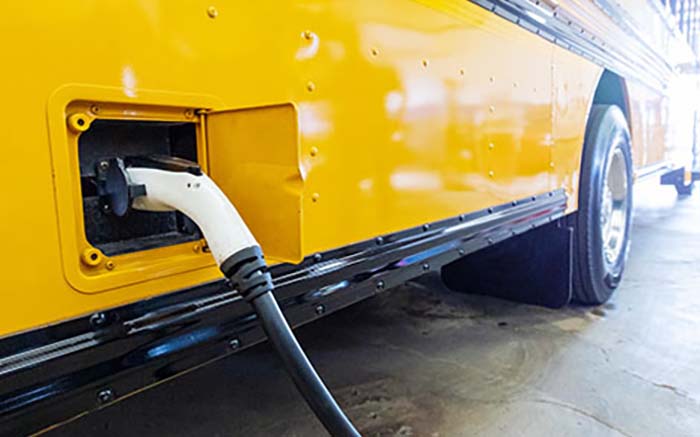FCPS to introduce electric school buses in 2020
Photo courtesy of Dominion Energy.
FCPS plans to send out eight electric buses, just like this one.
February 1, 2020
On Jan. 16, Fairfax County Public Schools (FCPS) received funding to become part of Dominion Energy’s initiative to send electric school buses around Virginia. This plan involves 50 electric buses that will be distributed around the state, eight of which will go to FCPS.
The proposal was first presented in August 2019 by Governor Ralph Northam and Dominion Energy.
“[Dominion] will support the deployment of 50 electric school buses within its service territory by the end of 2020,” Jeffrey Platenberg, Assistant Superintendent Facilities and Transportation Services said. “The goal [is] replacing all diesel school buses in the state by 2030.”
As one of the nation’s largest school systems, FCPS hopes to set the tone for environmentally friendly initiatives for other school divisions by promoting clean energy.
“The School Board’s commitment to environmental stewardship and sustainability are represented in our strategic goals and the work that we are doing with the Board of Supervisors on the Joint Environmental Task Force,” Karen Corbett Sanders, Fairfax County School Board Chair, said in an interview with FCPS officials on Jan. 16. “This new partnership is part of an exciting movement towards sustainability programs for our facilities and transportation that we continue to explore.”
The electric models will play a role in shrinking Fairfax County’s carbon footprint and meet energy demands with renewable and sustainable energy, as opposed to fossil fuels. FCPS will pay for these electric buses the same amount as they do for diesel-fueled buses through the plan negotiated with Dominion.
“Dominion Energy has agreed to fund the charging infrastructure,” Platenberg said. “[However], the terms of this agreement are still underway.”
The electric buses will also have similar maneuverability and controls to a diesel bus; the only thing that changes is the fuel source. As such, little will change for the lives of bus drivers in terms of driving.
“I’ve never driven an electric bus, but I think it will be like the regular bus,” Ms. Mint, an FCPS bus driver whose route comes to Jefferson, said. “It should be the same, but the [better] thing about them is that we can help save our environment.”
Saving the environment is not a foreign task to FCPS–in the past, it has worked on reducing fuel consumption by 72,500 metric tons (35%). With this initiative, FCPS hopes to further their efforts to become more eco-friendly.
“We are hopeful that this concept provides a more sustainable and healthier approach in transportation for our students,” Platenberg said.






